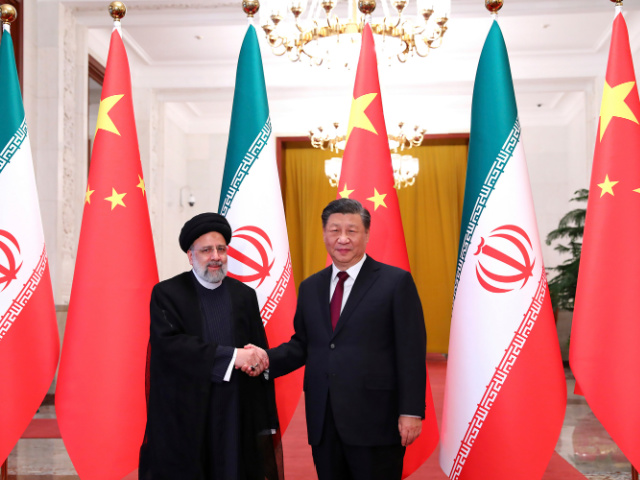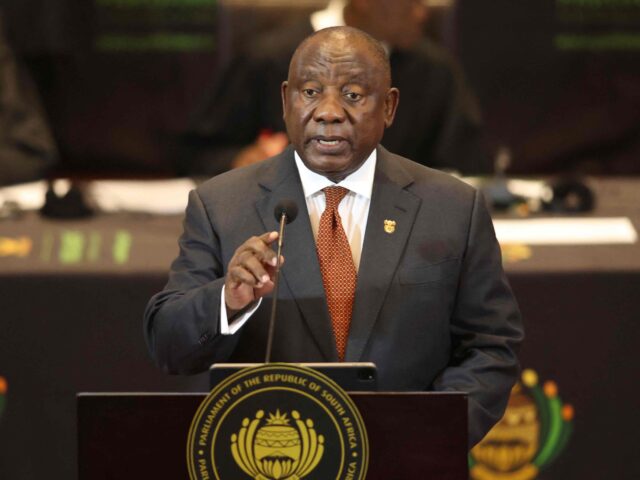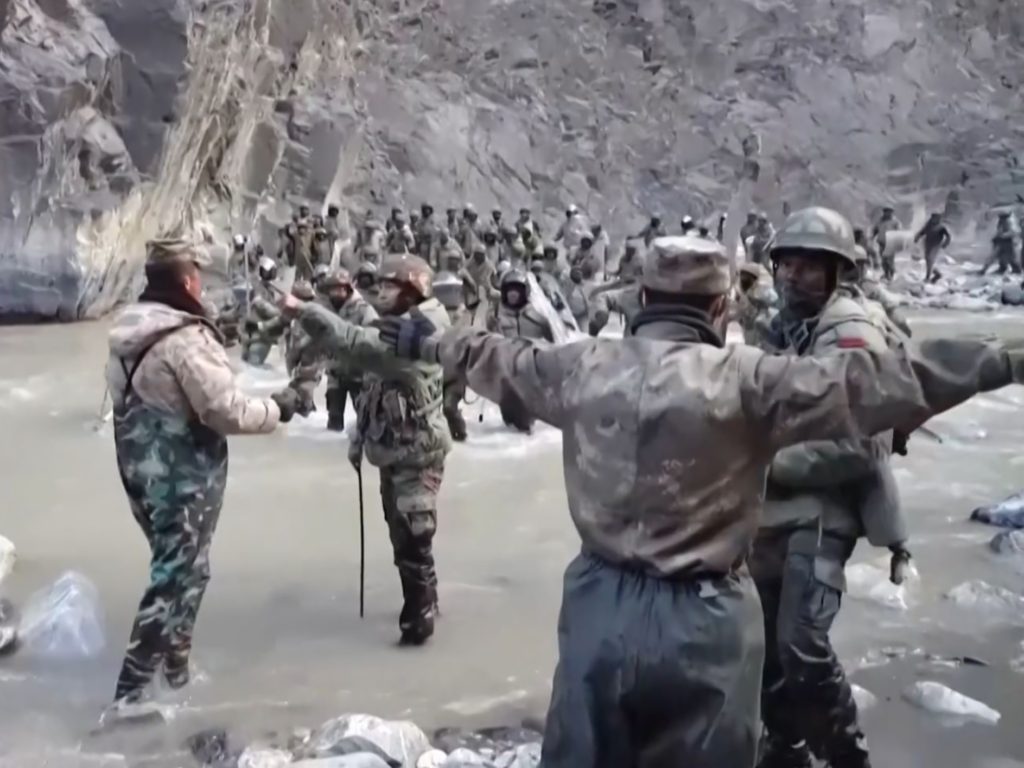South African officials confirmed last week that the BRICS coalition — South Africa, China, India, Russia, and Brazil — is considering expanding membership, a proposal that would potentially force archrivals Saudi Arabia and Iran into an alliance.
Both Saudi and Iranian officials have openly expressed interest in applying for BRICS membership and are each other’s top geopolitical rivals. Sunni Saudi Arabia is home to the holiest sites in Islam, a status the Shiite regime in Iran has openly challenged. The Saudis, in turn, have questioned if the Islamist regime in Tehran is Muslim at all.
More tangibly, Iran has funded multiple terrorist movements in the past decade — thanks to President Obama’s Joint Comprehensive Plan of Action (JCPOA) — that have jeopardized Saudi Arabia’s security and diplomatic interests. The Shiite Houthi terrorist movement in Yemen has been particularly threatening to Riyadh, bombing oil facilities in the country and forcing Saudi officials to state last year they cannot guarantee the safety of its prodigious oil supply if the Houthis continue their attacks.
BRICS is primarily an economic coalition, largely intended to carve out a parallel global commerce system independent of the U.S. dollar. Russian Foreign Minister Sergey Lavrov suggested in January that BRICS would consider establishing a common currency, similar to the Euro, to challenge the U.S. dollar.
Russian Foreign Minister Sergey Lavrov said that BRICS countries will discuss creating a common currency at the group’s forthcoming summit in South Africa https://t.co/z4kRRn1YqZ pic.twitter.com/MYMfSwBr2x
— ANADOLU AGENCY (@anadoluagency) January 25, 2023
“Serious, self-respecting countries are well aware of what is at stake, see the incompetence of the ‘masters’ of the current international monetary and financial system,” Lavrov said, “and want to create their own mechanisms to ensure sustainable development, which will be protected from outside dictates.”
The resilience of the coalition, despite stark ideological differences, has been vividly displayed in the past year with India’s skyrocketing trade with Russia, South Africa staging joint military exercises with China and Russia this week, and Brazil’s refusal to condemn Russia’s invasion of Ukraine or China’s Uyghur genocide under conservative former President Jair Bolsonaro. India and China remaining allies in the coalition is particularly impressive as the two countries’ relationship has deteriorated to nearly Iran-Saudi Arabia levels in the past three years, hitting a low point with the battle at the Galwan Valley in 2020. Chinese and Indian soldiers bludgeoned each other to death on their mutual border in June of that year after Chinese People’s Liberation Army (PLA) soldiers began erecting tents on Indian territory.
![This video frame grab taken from footage recorded in mid-June 2020 and released by China Central Television (CCTV) on February 20, 2021 shows Chinese (foreground) and Indian soldiers (R, background) during an incident where troops from both countries clashed in the Line of Actual Control (LAC) in the Galwan Valley, in the Karakoram Mountains in the Himalayas. (Photo by - / CCTV / AFP) / China OUT / RESTRICTED TO EDITORIAL USE - MANDATORY CREDIT "AFP PHOTO / CHINA CENTRAL TELEVISION (CCTV) " - NO MARKETING NO ADVERTISING CAMPAIGNS - DISTRIBUTED AS A SERVICE TO CLIENTS / The erroneous mention[s] appearing in the metadata of this photo by - has been modified in AFP systems in the following manner: [February 20, 2021] instead of [January 20, 2021]. Please immediately remove the erroneous mention[s] from all your online services and delete it (them) from your servers. If you have been authorized by AFP to distribute it (them) to third parties, please ensure that the same actions are carried out by them. Failure to promptly comply with these instructions will entail liability on your part for any continued or post notification usage. Therefore we thank you very much for all your attention and prompt action. We are sorry for the inconvenience this notification may cause and remain at your disposal for any further information you may require. (Photo by -/CCTV/AFP via Getty Images)](https://media.breitbart.com/media/2021/05/Report_-China-Rebuilding-Military-Presence-Along-Indian-Border-1024x768.jpg)
This video frame grab taken from footage recorded in mid-June 2020 and released by China Central Television (CCTV) on February 20, 2021 shows Chinese (foreground) and Indian soldiers (R, background) during an incident where troops from both countries clashed in the Line of Actual Control (LAC) in the Galwan Valley, in the Karakoram Mountains in the Himalayas. (-/CCTV/AFP via Getty Images)
In December, hundreds of Chinese soldiers invaded India once again, resulting in yet another battle fought with fists and sticks. Neither Beijing nor New Delhi has ceded any territorial claims despite the growing frequency of their clashes. Both remain active and productive members of BRICS.
The coalition may have something similar in mind for Iran and Saudi Arabia.
Anil Sooklal, South Africa’s ambassador to BRICS, told Bloomberg last week that the countries would debate and potentially vote on adding new members this year. South Africa holds the rotating presidency of the coalition this year; the next summit is scheduled to take place in August.
“There are over a dozen countries that have knocked on the door,” Sooklal confirmed. “We are quite advanced at looking at a further group of new members.”
Sooklal confirmed that Iran and Saudi Arabia were on the list. Also mentioned were “Argentina, the United Arab Emirates, Algeria, Egypt, Bahrain and Indonesia, along with two nations from East Africa and one from West Africa — which Sooklal didn’t identify,” according to Bloomberg.
Argentina reportedly formalized its request to join the coalition last year at the same time as Iran. Iran orchestrated the deadliest terrorist attack in the history of the Western Hemisphere prior to September 11, 2001, in Buenos Aires: the 1994 bombing of the Argentine-Israeli Mutual Association (AMIA). Argentina’s socialist government has seen faced repeated accusations of protecting Iranian terrorists on the world stage in exchange for lucrative business contracts.

Jewish men, right, look on as rescuers sift through the rubble at the site of a car-bombing at the Asociacion Mutual Israelita Argentina (AMIA) Jewish Community Center in Buenos Aires, Argentina, on July 18, 1994. (Diego Levy/Bloomberg via Getty Images)
“While the White House was thinking about what else to turn off in the world, ban or spoil, Argentina and Iran applied to join the BRICS,” Russian Foreign Ministry spokeswoman Maria Zakharova wrote in a statement on her social media account in June.
The pro-China news network listed several potential hurdles to adding new members, including concerns out of Brazil that too many Asian countries would dilute Latin America’s voice in the organization and Indian concerns that BRICS should standardize the rules for applying to join.

In this photo released by the official website of the office of the Iranian Presidency, President Ebrahim Raisi, left, shakes hands with his Chinese counterpart Xi Jinping in an official welcoming ceremony in Beijing, Tuesday, February 14, 2023. (Iranian Presidency Office via AP)
Iranian President Ebrahim Raisi was in China last week as the Bloomberg report was published. Raisi explicitly mentioned an interest in joining BRICS during his meeting with dictator Xi Jinping, state news agencies of both countries confirmed.
“Iran highly values China’s role in Iran’s accession to the Shanghai Cooperation Organization and hopes for Beijing’s assistance in joining the BRICS,” Iran’s state-run IRNA reported.
Iran and China signed multiple major economic and diplomatic agreements during Raisi’s visit, including a deal to jointly combat “terrorism.” Iran is widely considered the world’s most prolific state sponsor of terrorism.
Iran’s reported interest in BRICS has surfaced publicly nearly simultaneously with Saudi Arabia’s. In October, during a visit to Riyadh, South African President Cyril Ramaphosa confirmed that Saudi Arabia was interested in joining the coalition.

South African President Cyril Ramaphosa delivers his speech during the 2023 state-of-the-nation address (SONA) at the Cape Town City Hall in Cape Town on February 9, 2023. (ESA ALEXANDER/POOL/AFP via Getty Images)
“The Crown Prince (prime minister Mohammad bin Salman bin Abdulaziz al Saud) did express Saudi Arabia’s desire to be part of Brics and they are not the only country,” said Ramaphosa at the time.
“The BRICS nations are going to be meeting in a summit next year under the chairship of South Africa. And the matter is going to be under consideration,” the president explained. “And already a number of countries or nations have been making approaches to the other member countries, and we’ve given them the same answer to say it’ll be discussed by the BRICS partners themselves, five of them, and thereafter a decision will be made.”
Ramaphosa made the comments after meeting with Saudi Crown Prince Mohammed bin Salman.
Xi Jinping visited Riyadh in December, receiving a far warmer welcome than his American counterpart Joe Biden in the summer. Chinese state media confirmed that Saudi officials had expressed a desire to join BRICS. Two months later, Russian Ambassador to Riyadh Sergey Kozlov suggested that the country had “good prospects” to join the group, notable as Russia is one of Iran’s closest allies.
Mohammed bin Salman, the de facto ruler of Saudi Arabia, had expressed a willingness to normalize relations with Iran in the past – before the Houthi attacks on Saudi oil facilities.
“At the end of the day, Iran is a neighboring country,” bin Salman said in a 2021 interview. “All what [sic] we ask for is to have a good and distinguished relationship with Iran. We do not want the situation with Iran to be difficult. On the contrary, we want it to prosper and grow as we have Saudi interests in Iran, and they have Iranian interests in Saudi Arabia, which is to drive prosperity and growth in the region and the entire world.”
Saudi Arabia once again hardened its stance after the attacks, however, reiterating its long-term stance that Iran gaining nuclear weapons would immediately prompt Riyadh to obtain one itself.
Follow Frances Martel on Facebook and Twitter.


